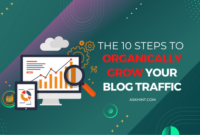Trying to rank higher in Google can feel like a never-ending battle. Especially when you’re up against larger companies with bigger budgets. But don’t despair—it is possible to rank higher, even on a shoestring budget. All it takes is a little know-how and a lot of elbow grease. In this blog post, we explore 10 tips that will help you rank higher in Google, without breaking the bank. So read on and start climbing those search results!
Use Keywords
One of the most important things you can do to improve your ranking in Google is to use relevant keywords throughout your website and blog content. By including these keywords in your titles, headings, and body text, you are more likely to rank higher in Google search results.
In addition to using keywords throughout your site, you should also focus on creating quality content that is informative and engaging. This will not only help you rank higher in Google, but it will also keep readers coming back for more.
Finally, don’t forget to promote your content across the web. The more people that see and share your articles, the better your chances of ranking high in Google.
Optimize Your Title Tags
Your title tags are one of the most important aspects of on-page SEO. They are what show up in the search results as your title, and they should be optimized to entice clicks. Here are some tips to help you optimize your title tags:
1. Keep it short and sweet – Your title should be no longer than 60 characters, including spaces. This is because Google will truncate your title in the search results if it’s too long.
2. Use keywords wisely – Choose your keywords carefully and place them strategically in your title. Don’t stuff your title with keywords, but do make sure that your target keyword is included.
3. Make it relevant – Your title should be relevant to the content on your page. Not only will this help with SEO, but it will also help increase your click-through rate from the search results.
4. Use catchy language – In addition to being relevant, your title should also be catchy and interesting enough to make people want to click on it. Try to use power words and actionable language to get people intrigued.
Optimize Your Meta Descriptions
If you want to rank higher in Google, one of the best things you can do is optimize your meta descriptions. Meta descriptions are the brief text snippets that appear under your page’s title in the search results. They give searchers an idea of what your page is about and can influence whether or not they click through to your site.
Here are some tips for optimizing your meta descriptions:
– Keep them short and to the point: Meta descriptions should be around 155 characters long. This gives you enough space to include relevant keywords and a call to action, without being too verbose.
– Focus on benefits: When writing your meta description, focus on what benefits users will get by clicking through to your site. What information or product will they find? How will it solve their problem?
– Use keyword-rich phrases: Include relevant keywords in your meta descriptions so that they show up in bold when users search for those terms. This helps improve click-through rates as it makes it clear that your page is relevant to what they’re looking for.
By following these tips, you can write meta descriptions that are more likely to result in clicks and higher rankings in Google.
Use Structured Data
Structured data is a standardized format for providing information about a page and classifying the page content. It is used to make your site more understandable for search engines, making it easier to rank higher in Google search results.
To add structured data to your site, you need to include specific HTML tags in your code. These tags provide information about the page content, such as the type of content, the subject matter, and other details. You can find more information about adding structured data to your site in Google’s Structured Data Markup Helper.
Including structured data on your site can help you rank higher in Google search results by making your site more understandable for search engines. By providing information about your page content, you can make it easier for Google to index and classify your pages, making it more likely that your pages will appear in relevant search results.
Optimize Your Images
It’s no secret that images can make or break a website. Studies have shown that pages with images are more likely to be shared on social media, and that people are more likely to remember information when it’s presented alongside an image.
That’s why it’s so important to optimize your images for Google. Here are a few tips to help you get started:
1. Use descriptive file names: When you save your images, be sure to use descriptive file names that include keywords relevant to your topic. For example, instead of saving an image as “IMG1234.jpg,” try something like “green-tea-benefits.jpg.”
2. Add alt text: Alt text is the text that appears in place of an image if it can’t be displayed for some reason. It’s also used by search engines to understand what an image is about. Be sure to add alt text to all of your images, using keywords where appropriate.
3. Resize large images: Large images can slow down your website, which can hurt your search engine ranking. Before you upload an image, be sure to resize it so that it’s no larger than necessary.
4. Choose the right format: There are many different image formats (JPEG, PNG, GIF, etc.), and each has its own advantages and disadvantages. Choose the format that best suits your needs while still providing good quality.
5. Compress your images:
Use Internal Links
When it comes to ranking higher in Google, one of the best things you can do is to use internal links. By linking to other pages on your website, you’re not only helping Google understand your website better, but you’re also giving users an easy way to navigate your site.
One thing to keep in mind when using internal links is to use keyword-rich anchor text. This will help Google understand what the page you’re linking to is about, and could also help that page rank higher in search results.
Another tip is to link to relevant pages. For example, if you have a blog post about tips for eating healthy, you might want to link to a page on your website that has more information about healthy eating habits. By doing this, you’re not only helping Google understand your website better, but you’re also providing users with valuable resources.
Promote Your Content
If you want your content to rank higher in Google, then you need to promote it! Here are some tips to help you get started:
1. Make sure your site is well-optimized for search engines. This means ensuring that your titles and descriptions are keyword-rich and that your site structure is easy for Google to crawl.
2. Use social media to spread the word about your content. Post links to your articles on Twitter, Facebook, and other social networks.
3. Get involved in the online community related to your topic. Comment on other blogs, participate in forums, and build relationships with other webmasters.
4. Submit your site to directories and search engines. This will help give your site more exposure and help Google index your pages faster.
5. Create compelling content that people will want to share. If your content is interesting and useful, people will be more likely to link to it and share it with others.
Build High-Quality Backlinks
The first step to ranking higher in Google is to build high-quality backlinks. Backlinks are links from other websites to your website. The more high-quality backlinks you have, the higher your website will rank in Google.
There are a few ways to build high-quality backlinks:
1. Reach out to websites in your industry and ask for a link.
2. Guest blog on high-authority websites in your industry.
3. Create helpful resources (like infographics, ebooks, and blog posts) and share them on social media and other websites. Make sure to include a link back to your website.
4. Partner with other websites in your industry to create joint content (like webinars, blog posts, and ebooks). Again, be sure to include a link back to your website.
By following these tips, you can start building high-quality backlinks and improve your ranking in Google!
Monitor Your Progress
Assuming you’re already taking the necessary steps to rank higher in Google (i.e. keyword research, on-page optimization, link building, etc.), it’s important to monitor your progress to see if your efforts are paying off. Here are a few tips for doing just that:
1) Check your Google Search Console account regularly. This tool will show you how your site is performing in Google search results, and can help you identify any potential issues that need to be addressed.
2) Set up Google Analytics and check your traffic data regularly. This will give you an idea of how much organic traffic you’re getting from Google, and whether or not it’s increasing over time.
3) Use a rank tracking tool like SEMrush or Moz Pro to track your keywords’ positions in Google. This way, you can see how your keywords are ranking over time and identify any areas where you need to improve.
4) Keep an eye on your competition. See what they’re doing to rank higher in Google, and try to emulate their best practices (within reason).
By following these tips, you should have a good idea of how well your SEO efforts are paying off and where you need to continue working to improve your rankings.
Conclusion
Ranking higher in Google isn’t easy, but it’s definitely doable with the right approach. Follow these tips and you’ll be well on your way to improving your ranking and getting more traffic to your website. And remember, always keep testing different techniques to see what works best for you and your site.



